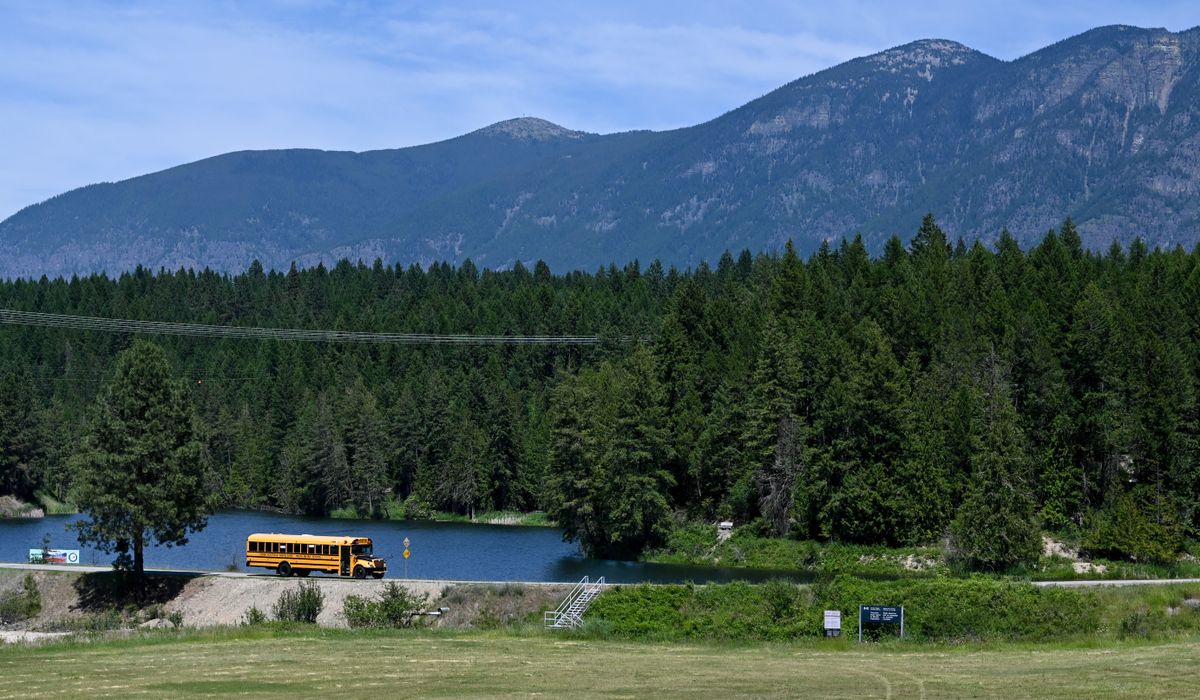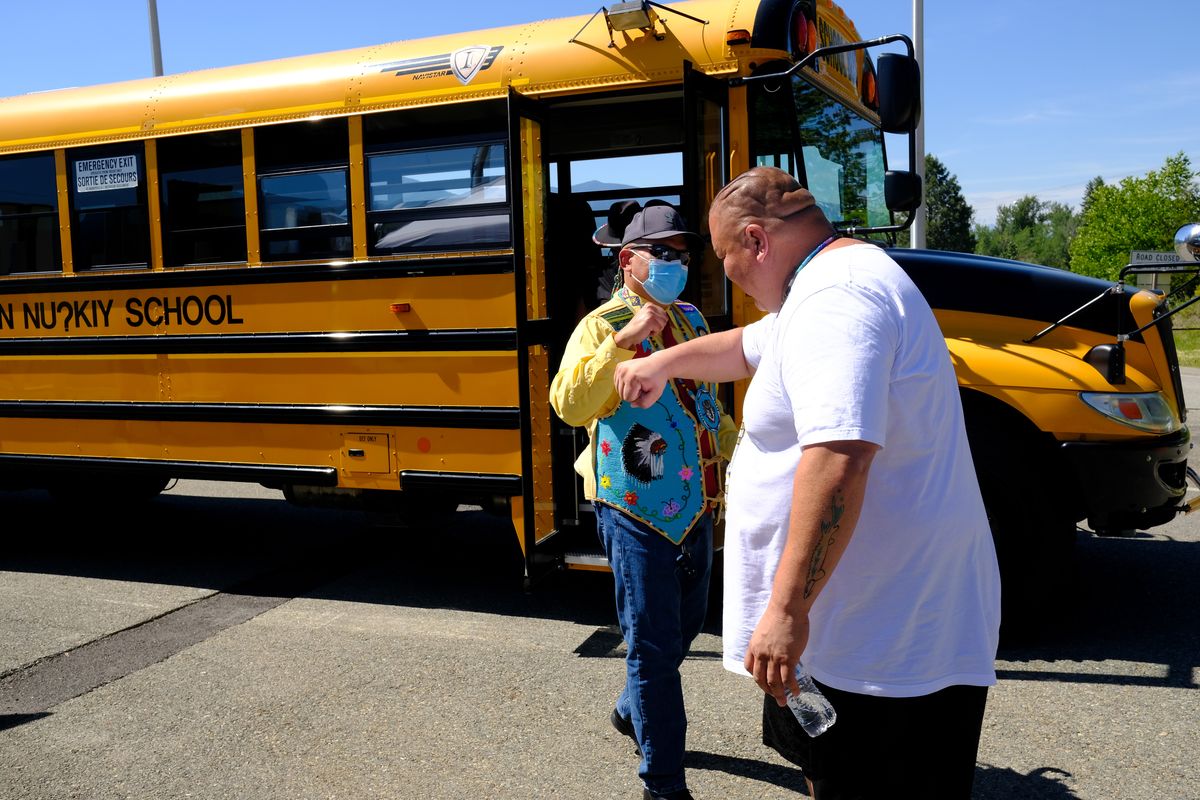‘Well worth it’: Kootenai Tribe holds cross-border vaccine clinic with Kootenay Tribe of British Columbia

PORTHILL, Idaho – When one of the last Canadian buses pulled up to the United States border Monday, a woman in the front row poked her head out the window.
“Hi Dianne!” Eldine Stanley, of the British Columbia Lower Kootenai Band, shouted. “Thank you for doing this!”
Dianne David, Kootenai Tribal Council member, left her spot under a nearby tent to greet her cousin in the doorway of the bus. She had been positioned there all day, helping to oversee the cross-border vaccination clinic between the Kootenai Tribe of Idaho and the Lower Kootenay Band of British Columbia.
“Is that cousin Gary?” Stanley said, calling Kootenai Tribe Council Chairman Gary Aitken Jr. over for a picture.
It was the first time the cousins had seen each other in more than 15 months apart. The border had been closed since the beginning of the COVID-19 pandemic in March 2020.
Their reunion was part of a cross-border pop-up vaccination clinic at the Idaho-British Columbia border. As a Canadian Indigenous Peoples’ Day celebration, the clinic gave more than 160 shots – mostly second doses – to tribal and Creston, British Columbia, community members, as well as a few Canadian border patrol officers .

Although nearly 76% of eligible Canadians have had one dose of COVID-19 vaccine, the country has lagged at getting its residents their second doses. As of Monday, 22% of the eligible population had both doses.
As it took place across international borders, the clinic involved a lot of logistics.
“But what we did was well worth it,” Lower Kootenay Tribe Chief Jason Louie said in a ceremony after the clinic.
School buses of 10 to 12 socially distant community members from Creston, were driven over from Canada and parked right in front of the U.S. entrance.
Nurses from the Kootenai Tribe and the Panhandle Health District then boarded the bus, helped the passengers fill out paperwork and gave the riders their second dose. When they were done, some bus passengers cheered.
Everyone getting their vaccine was grateful, the nurses administering it said.
As the United States’ vaccine rollout increased and Canada’s slowed, Louie became frustrated with the lack of access to second doses for his community.
There wasn’t a lot of consistency with how they were getting second doses, Louie said.
“Canada won’t admit their vaccine rollout was a disaster,” he said.
In the beginning, he said it became apparent the community was on its own.
“So we made our own plan,” Louie said.
Louie had an idea: what if his tribe could benefit from extra doses not used by the Kootenai Tribe in Idaho?
Because of restrictions from the Centers for Disease Control and Prevention restrictions, the vaccine can’t be donated internationally, but he and the Kootenai Tribe of Idaho decided to try to set up a clinic on the border.
First, they had to get the OK from both Idaho and British Columbia. Then, they had to work with both countries’ border patrols to figure out logistics.
Ensuring Canadians could cross, get a shot and cross back involved a lot of logistics, said Karen Hanson, health director at the Kootenai Tribe of Idaho. There were so many “what if” scenarios to go through.
The Canadian-U.S. border has been closed to nonessential travel since March 2020. Families with members on both sides can’t see each other. Residents of border towns can’t cross for the day to access services like they normally do.
To cross the border for Monday’s vaccination clinic, Canadians wanting a shot needed a letter stating that their reason for crossing the border was a medical necessity. When they got to the U.S. side, they were not allowed to leave the bus. When they returned to Canada, they had to prove to border patrol that they did get a shot.
If they skipped any of those steps, they would have to quarantine for 14 days and could face a fine.
At the end of Monday, everything had gone smoothly, Hanson said.
The clinic coincided with Canada’s Indigenous People’s Day. In the past, the tribes often spent the day singing and dancing, but it always felt like they were “putting on a show,” Aitken said.
Celebrating by hosting this vaccination clinic instead showed the spirit of togetherness and generosity the tribes have, he said. Aitken, who helped facilitate the clinic, said he felt blessed the tribe was able to help.
“You made history today,” Louie said in a closing ceremony. “On this Indigenous Peoples’ Day, I truly believe we made our ancestors happy.”
The two tribes are part of the Ktunaxa Nation with lands on either side of the border. When the border was decided, “wherever you were, you were planted,” David said.
“The 49th parallel literally cut us in half,” Louie said.
Before the pandemic closure, the two were “very interconnected,” Aitken said.
Now, it’s been months since they’ve had any cross-border ceremonies.
David, like many others, has dual citizenship but hasn’t been able to cross to see family, even though they’re only 30 miles away.
Louie, who lives in Canada and was the only Canadian allowed to go back and forth on Monday, escorted by border patrol, has two daughters in Seattle. He hasn’t seen them in months, he said. It’s part of why he wanted to put on a vaccination clinic.
“It’s one step closer to me being able to see my daughters,” he said. He added that when the border opens, he doesn’t know when or how, but “I’m going that way,” pointing to the United States.
When the border reopens and the pandemic winds down, David said she’ll be happy that she’s healthy.
“And that I survived.”
As American Indian and Alaska Native people have been hit disproportionately hard by the pandemic, Monday’s vaccination clinic was even more important to the tribes, David said.
As the last bus made its way back across the Canadian border, Aitken looked around. Six hours and more than 160 people, the clinic was over.
“We did it!” he said, pumping his fist in the air. “It’s awesome.”